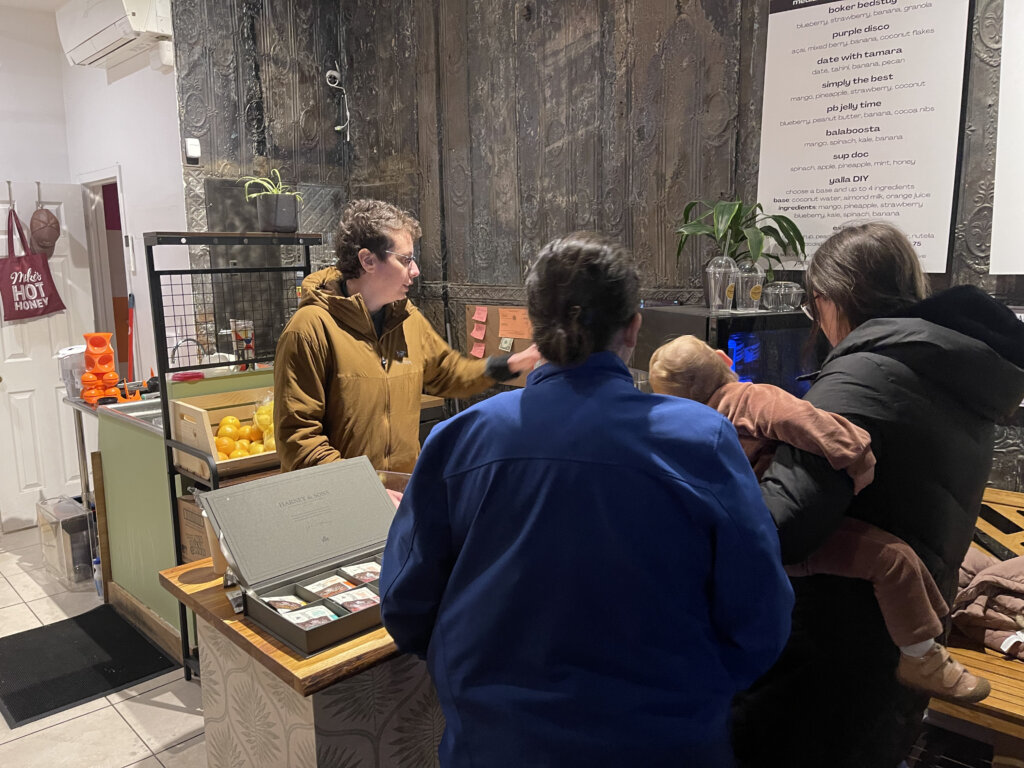She lost a friend in Hamas’ attack. Then neighbors called for a boycott of her ‘ugly zio’ juice bar
“I didn’t expect this and I don’t feel safe anymore,” said Reut Levi, who opened Tamar Juice Bar in June

Graphic by Angelie Zaslavsky
When Brooklyn juice bar owner Reut Levi woke up in Israel on Oct. 7, the morning after a friend’s wedding near the Sea of Galilee, she saw she had missed 35 calls from her parents and over 100 push notifications from news outlets about Hamas’ attacks in the south. She soon learned that the terrorists had killed another friend of hers at the Nova music festival. Levi spent the next two weeks in her native Israel, grieving and worrying for her family’s safety.
The turmoil followed her home to Bedford-Stuyvesant, the Brooklyn neighborhood where she lives and opened Tamar Juice Bar in June.
Levi, 37, moved to what locals call Bed-Stuy 15 years ago, she said, because it seemed a safe, tolerant place for a lesbian like her, a person who feels most comfortable in multicultural places. In the few months since the juice bar opened, it had become somewhat of a neighborhood landmark, especially for young, queer Brooklynites.
But Levi learned after Oct. 7 that she has some neighbors who want to see her business fail, and that they said and wrote that it’s because she’s Israeli and Jewish.
“I didn’t expect this and I don’t feel safe anymore,” Levi said. “But I have no choice but to go on with what I’ve always done here.”
She also learned that she has friends she had never met before, mostly Jews and Israelis, who want her business to thrive in Bed-Stuy.
Her experience mirrors that of other business owners targeted since the beginning of the Israel-Hamas war because they are Israel, pro-Israel or Jewish, and comes at a time of spiking antisemitism in the U.S. and and globally. Vandals defaced the facade of Canter’s Deli in Los Angeles, for example. And a Greek diner on Long Island withstood a boycott after its owner flew the Israeli flag outside the restaurant and plastered its windows with posters of those kidnapped by Hamas. Business tanked until droves of customers angered by the boycott began eating there. Levi’s juice shop has also enjoyed such support, but she still wonders whether it can survive war in the Middle East.
‘They ain’t welcome here’
Levi knew Tamar Juice Bar might be vulnerable in the aftermath of Hamas’ attack, as Israel began retaliating in Gaza. Both she and her business partner Michal Mualem are Israeli, Tamar is one of the most popular names in Israel and their menu has a strong Middle Eastern flavor. Levi decided to post only on her personal Instagram account — not the juice bar’s. Most of her posts memorialized the victims of Oct. 7. She did not call for retribution.
“My political view is that I really wish that the people of Gaza will have the most beautiful life as soon as possible,” Levi told me as she lit a cigarette. “They can have it. They must have it.”

But last Saturday, one of Levi’s customers on Instagram accused her of supporting genocide and called for a boycott of the juice bar. “The same way we are asked to boycott big corporations participating in the oppression of black/brown, let’s keep the same energy with those promoting racism and support of genocide right under our noses,” the customer wrote, tagging the the juice bar’s profile so her followers would know which business to boycott.
Levi decided not to respond so as not to stoke the vitriol. But then other Instagram influencers in Bed-Stuy began posting photos of the juice bar and screenshots of its Instagram profile, with some seemingly inviting neighbors to harass Levi. “Don’t go to this trash ass place yall. Matter of fact feel free to let them know how much they ain’t welcome here,” wrote one.
They posts kept coming: “Bed-Stuy Neighbors Beware: Tamar Juice bar is a Zionist establishment;” “Liberation from apartheid, from colonizers, from occupiers in Bed-Stuy;” “There are ugly zio businesses in our very own neighborhoods who steal & appropriate Pali food & culture.”
The next day the action moved from online to the real world. A woman showed up outside the juice bar, Levi said, and began taking videos of her and calling her a “racist Zionist who supports genocide.” Reut locked herself in the bar and called the police, who told the woman to get away from the premises. A few hours later seven other women entered the bar without ordering anything. Levi said one of them asked her: “Are you the Israeli Jewish person here?” They laughed at her, frightened her “like never before,” Levi said. Shortly after they left she found stickers outside the juice bar calling for “Global Intifada.”
“I lived in Israel. I know what an Intifada is, and I can assure you it’s not a good thing,” Levi told me.
A future in Bed-Stuy?
Levi got the idea for her business when she first moved to the U.S. and began working at a mall in upstate New York managing two kiosks which sold smoothies and ice cream. One day, she decided, she would also sell smoothies, but infused with the flavors of Israel. Tamar Juice Bar — tamar means “date” in Hebrew — offers a date-flavored smoothie. Another is called “Chic or Shuk,” a reference to Middle Eastern markets. Spiced honey cake is also on the menu.
The juice bar seemed a good fit for the neighborhood, but after Saturday’s incident, Levi feared her five-month-old business was about to die.
Then, on Monday afternoon, customers began showing up by the dozens, not to heckle, but to order smoothies, encouraged in private Facebook groups by Israeli and Jewish New Yorkers who had heard that she was being doxxed. A rabbi from Brooklyn ordered ten juices for ten police officers, and made them aware of the harassment Levi faced.
As she and I spoke outside the juice bar earlier this week, an Israeli man installed security cameras inside and outside the business. “I had bought them months ago but always felt safe here, so I didn’t install them,” Levi told me. “Today, however, I’m afraid, and this Israeli guy offered to install them for me for free to make me feel safer.”
Levi, who has removed every symbol of Israel and Judaism she ever had in her shop, worries about its future.
“I didn’t want to bring politics here. Jews and Israelis from all over New York have been coming in this week, but what will happen when they leave? Will my old customers from the neighborhood come back?”

















